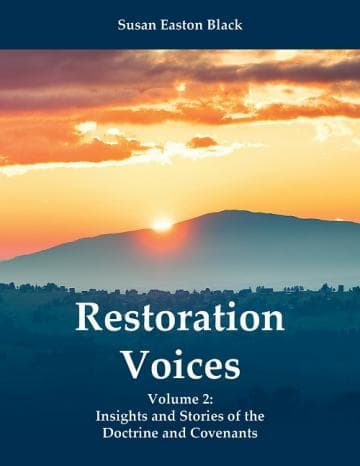Book
140 Chapters

On April 28 and 29, 1832, Joseph Smith visited the Saints residing near the Big Blue River, a few miles west of Independence, Missouri. Of his visit Joseph wrote, “[I] received a welcome only known by brethren and sisters united as one in the same faith, and by the same baptism, and supported by the same Lord. It is good to rejoice with the people of God.”[1]
One day later, on April 30, 1832, as Joseph sat in council with the Saints, he received a revelation advising them that women and children have claim upon their husbands and fathers for support, and widows and orphans have claim upon the Church. In other words, the revelation established an expectation and order for support. The responsibility of supporting a family rests with the husband and father. For widows and orphans, who are without a husband or father in the home, they may look to the Church.
Since the foundational meeting of The Church of Jesus Christ of Latter-day Saints on April 6, 1830, prophets and members alike have ministered in one way or another to those in need of support. Take, for instance, Bishop Newel K. Whitney, who hosted “a sumptuous feast ... after the order of the Son of God, the lame, the halt, & the blind were invited according to the instructions of the Saviour. ... We then received a bountiful refreshment.”[2] Then there was the Prophet Joseph Smith. Andrew J. Workman wrote,
I was at Joseph’s house; he was there, and several men were sitting on the fence. Joseph came out and spoke to us all. Pretty soon a man came up and said that a poor brother who lived out some distance from town had had his house burned down the night before. Nearly all of the men said they felt sorry for the man. Joseph put his hand in his pocket, took out five dollars and said, “I feel sorry for this brother to the amount of five dollars; how much do you all feel sorry?”[3]
Such care and support was not an isolated incident on the part of the prophet but one of many incidents that tell a story of giving assistance, which is vital to the eternal plan of our Father in Heaven, for as the Savior Jesus Christ taught, “Inasmuch as ye have done it unto one of the least of these my brethren, ye have done it unto me” (Matthew 25:40). When a rich man asked the Savior, “Master, which is the great commandment in the law? Jesus said unto him, Thou shalt love the Lord thy God with all thy heart, and with all thy soul, and with all thy mind. This is the first and great commandment. And the second is like unto it, Thou shalt love thy neighbour as thyself” (Matthew 22:36–39).
Through the years, the Church has followed the expectation and order for support as established in D&C 83. For example, in 1849 Brigham Young founded the Perpetual Emigrating Fund Company, commonly referred to as the Perpetual Emigration Fund, to provide economic assistance to more than thirty thousand Latter-day Saints who desired to emigrate to the Salt Lake Valley and surrounding regions. In 1851 President Young instituted a program of teaching Native Americans to farm by appointing three men as “farmers to the Indians.” By 1857 the three elders had helped the Native Americans cultivate more than seven hundred acres.[4] In 1896, forty years before the inauguration of a public employment service in the United States, Wilford Woodruff established an employment bureau for gathering and publishing information on employment opportunities as well as compiling data on those needing employment. In 1918 Joseph F. Smith invited the women of the Church to contribute 200,000 bushels of “first class milling wheat” to the United States government to distribute to starving women and children of the Allies following World War I. And so forth.
Why such offerings? Everyone at one point or another has need of support. Bishop Charles W. Nibley wrote of Joseph F. Smith returning to Honolulu and seeing the woman who had cared for him in his extremities:
As we landed at the wharf in Honolulu, the native Saints were out in great numbers with their wreaths of leis, beautiful flowers of every variety and hue. ... In the midst of it all I noticed a poor, old, blind woman, tottering under the weight of about ninety years, being led in. She had a few choice bananas in her hand. It was her all—her offering. She was calling, “Iosepa, Iosepa.” Instantly, when [Joseph F. Smith] saw her, he ran to her and clasped her in his arms, hugged her, and kissed her over and over again, patting her on the head saying, “Mama, Mama, my dear old Mama.”
And with tears streaming down his cheeks he turned to me and said, “Charlie, she nursed me when I was a boy, sick and without anyone to care for me. She took me in and was a mother to me.”[5]
[1] History, 1838–1856, volume A-1 [23 December 1805–30 August 1834], 213. Joseph Smith Papers.
[2] History, 1834–1836, 171. Joseph Smith Papers.
[3] Andrew J. Workman, in “Recollections of the Prophet Joseph Smith,” Juvenile Instructor, October 1892, 641.
[4] Leonard J. Arrington, Brigham Young: American Moses (NY: Alfred A. Knopf, Inc., 1985), 217–18.
[5] Charles W. Nibley, “Reminiscences,” cited in Joseph F. Smith, Gospel Doctrine: Selections from the Sermons and Writings of Joseph F. Smith, Sixth President of the Church of Jesu Christ of Latter-day Saints (Salt Lake City: Deseret Book, 1963), 519–20.
Book
140 Chapters
Items in the BMC Archive are made publicly available for non-commercial, private use. Inclusion within the BMC Archive does not imply endorsement. Items do not represent the official views of The Church of Jesus Christ of Latter-day Saints or of Book of Mormon Central.